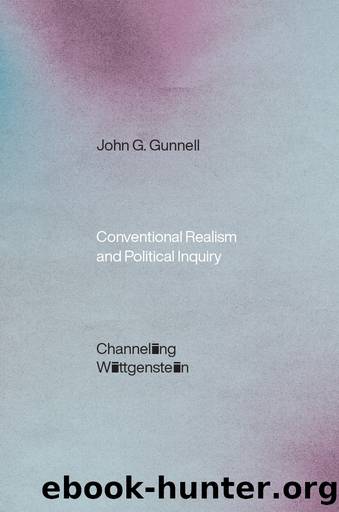Conventional Realism and Political Inquiry: Channeling Wittgenstein by John G. Gunnell

Author:John G. Gunnell [Gunnell, John G.]
Language: eng
Format: epub
Tags: Philosophy, History & Theory, Language, Political Science, Political
ISBN: 9780226661278
Google: M6TGDwAAQBAJ
Goodreads: 44179345
Publisher: University of Chicago Press
Published: 2020-01-15T07:46:12+00:00
Pinning Down Putnam
By the end of the twentieth century, Putnam had rejected dominant forms of scientific and metaphysical realism, including several to which he had once subscribed. He adopted a formulation that he explicitly equated with Wittgenstein and Austin (but which he claimed was foreshadowed in Aristotle as well as in the work of pragmatists such as William James and John Dewey). As in the case of Davidson, an interpretation of Putnam depends to a large extent on the stage in his work that a reader happens to engage his arguments. All his work had, however, involved a search for an answer to what he called âthe great question of realismâ or the problem of how language attaches to the world. As in the case of Davidson, however, there was a problem with what it means to speak about attaching to the world if the âworldâ is not defined.
Putnam had begun in the 1950s as a logical empiricist but by the 1960s had embraced semantic externalism and a causal theory of reference similar to that of Kripke as well as a functionalist theory of mind, that is, the claim that the mind and mental states are analogous to the software of a computer. By the end of the 1970s, however, he had rejected the assumption that knowledge is based on the existence of a mind/language independent world. He instead subscribed to what he referred to as âinternal realism,â which was an idealized image of epistemic justification that rejected the idea of a correspondence theory of truth. By the 1990s, however, he renounced this position as simply an alternative to or negation of metaphysical realism and as yet another fruitless attempt to specify some trans-contextual account of truth.
His final position was actually a challenge to the whole debate about such things as realism and anti-realism and to any claim about an absolute conception of the world. He recognized that it was a mistake to interpret Wittgenstein as an anti-realist, because Wittgenstein had rejected the assumptions that supported claims about both realism and anti-realism. Like Austin, Putnam argued that realism and anti-realism simply âmirrorâ one another. He claimed that it was the very failure of empiricism that had long ago driven philosophers toward idealism as a solution, but he nevertheless maintained that âthere is a way to do justice to our sense that knowledge claims are responsible to reality without recoiling into metaphysical fantasyâ (1999, 4). The phrase âresponsible to realityâ still seemed, however, to imply a lingering representationalist problematic, but, at the same time, he rejected the assumption âthat there must be an interface between our cognitive powers and the external worldâ (10). As an alternative, he advanced what he referred to as âdirect,â ânatural,â or âpragmaticâ realism. Somewhat like Davidson, he presented this new form of realism as a disposal of the issue how we access the âworldâ and the recognition, as a philosophical claim, of its needlessness and unintelligibility. But speaking about this disposal as direct realism might still seem to imply that there is a universal that stands behind all reality claims.
Download
This site does not store any files on its server. We only index and link to content provided by other sites. Please contact the content providers to delete copyright contents if any and email us, we'll remove relevant links or contents immediately.
Collaborating with Parents for Early School Success : The Achieving-Behaving-Caring Program by Stephanie H. McConaughy; Pam Kay; Julie A. Welkowitz; Kim Hewitt; Martha D. Fitzgerald(899)
Entrepreneurship Education and Training: The Issue of Effectiveness by Colette Henry Frances Hill Claire Leitch(666)
Adding Value to Policy Analysis and Advice by Claudia Scott; Karen Baehler(499)
Materializing the Middle Passage by Jane Webster;(497)
Race and American Political Development by unknow(490)
Sociological Perspectives of Health and Illness by Constantinos N. Phellas(479)
American Government and Politics Today by Steffen W. Schmidt Mack C. Shelley Barbara A. Bardes(477)
Human and Global Security : An Exploration of Terms by Peter Stoett(473)
Control Of Oil - Hardback by Kayal(468)
Advances in Child Development and Behavior, Volume 37 by Patricia J. Bauer(403)
The Disappearance of Rituals: A Topology of the Present by Byung-Chul Han(401)
The Catholic Church and European State Formation, AD 1000-1500 by Jørgen Møller(392)
The World According to China by Elizabeth C. Economy(387)
Theories of Counseling and Psychotherapy: A Case Approach by Nancy L. Murdock(372)
Left Is Not Woke by Susan Neiman(371)
Application of classical statistics, logratio transformation and multifractal approaches to delineate geochemical anomalies in the Zarshuran gold district, NW Iran by unknow(365)
Cross-Cultural Child Development for Social Workers by Lena Robinson(358)
Turkey's Relations with the West and the Turkic Republics: The Rise and Fall of the Turkish Model by Idris Bal(353)
Japan's Ainu Minority in Tokyo by Mark K. Watson(341)
